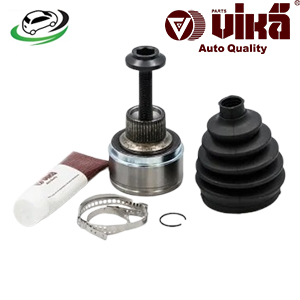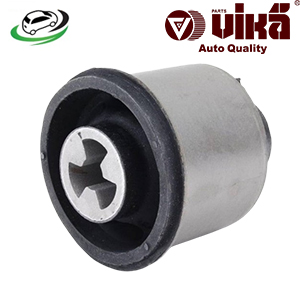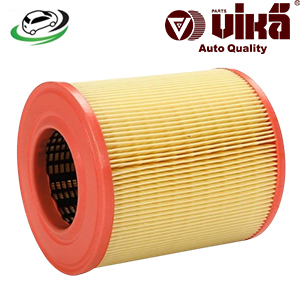-13%
Get Air Filter Audi A6 Avant 4F C6/AUDI 4F2/4F5 4F0133843A
An air filter is a device composed of fibrous or porous materials that removes solid particulates like dust, pollen, mold, and bacteria from the air. Filters containing an adsorbent or catalyst such as charcoal (carbon) may also remove odors and gaseous pollutants such as volatile organic compounds or ozone.
Types of Air Filters
- Mechanical Filters: These filters trap particles through a physical barrier. Common types include:
- Panel Filters: Typically made of cotton, polyester, or fiberglass, they are flat and rectangular.
- Pleated Filters: Have more surface area due to their pleated design, increasing their efficiency.
- High-Efficiency Particulate Air (HEPA) Filters: Capture at least 99.97% of particles as small as 0.3 microns.
- Electrostatic Filters: Use an electric charge to attract and trap particles. These can be permanent (washable) or disposable.
- Activated Carbon Filters: Utilize charcoal treated with oxygen to open up millions of tiny pores between the carbon atoms, which increases the surface area and allows these filters to adsorb odors and gases.
- UV Filters: Use ultraviolet light to kill or inactivate microorganisms, such as bacteria and viruses.
- Ionic Filters: Release negative ions into the air that attach to positive ions, causing them to drop out of the air or be captured by an oppositely charged collection plate.
Functions of Air Filters
- Air Purification: Removing contaminants from the air improves air quality, which is crucial for health, especially for individuals with allergies, asthma, or other respiratory conditions.
- Protecting Machinery and Equipment: In engines, HVAC systems, and other machinery, air filters prevent dust and other particles from entering and damaging internal components, thereby extending the lifespan of the equipment.
- Improving Efficiency: Clean air ensures that engines and HVAC systems operate efficiently. Dirty air filters can restrict airflow, causing the system to work harder and use more energy.
- Odor Removal: Activated carbon filters are particularly effective at removing unpleasant odors from the air.
Benefits of Air Filters
1. Health Benefits
Improved Respiratory Health
Air filters remove harmful particles such as dust, pollen, mold spores, and other allergens from the air, which can significantly reduce the risk of respiratory issues. This is particularly beneficial for individuals with asthma, allergies, or other respiratory conditions, helping to alleviate symptoms and improve overall lung function.
Reduction of Airborne Diseases
By capturing bacteria, viruses, and other pathogens, air filters can reduce the spread of airborne diseases. This is crucial in healthcare settings, homes, and workplaces to maintain a healthier environment.
Enhanced Indoor Air Quality
Air filters help to maintain a cleaner indoor environment by removing contaminants from the air. This is especially important in urban areas or industrial settings where air pollution levels are higher.
2. Efficiency and Performance Benefits
Improved System Efficiency
In HVAC systems and engines, clean air filters allow for better airflow, which helps the systems run more efficiently. This leads to more effective heating, cooling, or engine performance, reducing the workload on these systems.
Energy Savings
Efficient air filters reduce the energy consumption of HVAC systems and engines by ensuring they do not have to work harder due to restricted airflow. This can result in significant energy savings and lower utility bills.
Enhanced Equipment Longevity
Air filters prevent dust and debris from entering and damaging sensitive components of HVAC systems, engines, and other machinery. This protection leads to reduced wear and tear, fewer breakdowns, and a longer lifespan for the equipment.
3. Environmental Benefits
Reduced Carbon Footprint
By improving the efficiency of HVAC systems and engines, air filters help reduce energy consumption, which in turn lowers greenhouse gas emissions. This contributes to a smaller carbon footprint and supports environmental sustainability efforts.
Waste Reduction
High-quality, durable air filters can be reused and cleaned, reducing the amount of waste generated compared to disposable filters. Additionally, efficient air filters contribute to longer-lasting equipment, which means less frequent replacement and disposal of machinery parts.
4. Odor Control
Removal of Unpleasant Odors
Activated carbon filters are particularly effective at removing odors from the air. They adsorb volatile organic compounds (VOCs) and other odor-causing particles, leading to a fresher-smelling indoor environment.
Improvement in Overall Air Quality
By removing both particulate matter and gaseous pollutants, air filters contribute to a significant improvement in overall air quality, making indoor spaces more pleasant and comfortable.
5. Protection of Sensitive Environments
Clean Rooms and Laboratories
In environments where air quality is critical, such as clean rooms, laboratories, and manufacturing facilities for electronics or pharmaceuticals, air filters are essential. They maintain a controlled environment by removing microscopic contaminants that could affect product quality or research outcomes.
Industrial Applications
Air filters in industrial settings protect equipment and products from dust and other airborne particles that could cause damage or contamination. This is vital in industries such as food and beverage, pharmaceuticals, and electronics manufacturing.
6. Increased Productivity and Comfort
Enhanced Comfort Levels
Clean air contributes to a more comfortable indoor environment, reducing the presence of dust and allergens that can cause discomfort or distraction. This can lead to increased productivity and well-being, particularly in work or study environments.
Reduced Cleaning Needs
Air filters help to reduce the amount of dust and dirt that settles on surfaces, leading to less frequent cleaning and maintenance. This can save time and effort in homes, offices, and industrial settings.
Air Filter Maintenance
Proper maintenance of air filters is essential to ensure they function effectively. Here are some maintenance tips:
- Regular Inspection: Check air filters regularly, especially in high-use periods or in areas with high levels of dust and pollutants.
- Replacement: Follow the manufacturer’s recommendations for replacing disposable filters. Typically, filters should be replaced every 3 to 6 months, but this can vary based on usage and environmental conditions.
- Cleaning: For reusable filters, regular cleaning is necessary. This often involves washing the filter with water and a mild detergent, then allowing it to dry completely before reinstallation.
- Monitoring Performance: If you notice a decrease in air quality, unusual smells, or increased energy consumption, it might be time to inspect and replace or clean the air filter.
- Professional Maintenance: For complex systems, such as HVAC systems, consider professional maintenance to ensure filters and other components are properly maintained.
Specific Applications of Air Filters
- Automotive Air Filters: Protect the engine by filtering the air entering the combustion chamber, preventing damage from dust and debris.
- HVAC Systems: Maintain indoor air quality by trapping dust, pollen, and other particles from the air circulating through heating and cooling systems.
- Industrial Air Filters: Used in manufacturing and other industrial processes to remove particulates from the air, protecting equipment and ensuring a clean working environment.
- Home Air Purifiers: Stand-alone units that improve indoor air quality by removing pollutants from the air in a room or area.
- Clean Rooms: Used in laboratories and manufacturing environments where air quality is critical, such as in semiconductor manufacturing or pharmaceuticals.
Follow us on Facebook for more parts.



